News
Georgia Southern institute awarded funding to improve natural disaster emergency preparedness and response for students
January 31, 2024

As hurricanes, winter storms and the devastating effects of wildfires are frequently in the news, the importance of emergency preparedness remains at the forefront of public health.
Georgia Southern University’s Institute for Health Logistics and Analytics (IHLA) and graduate student Joana Tome have received a $20,000 grant from the Network of the National Library of Medicine (NNLM) to educate and train students on all three campuses in natural disaster emergency preparedness and response.
In partnership with Erick Riner, director of the University’s Office of Emergency Management, the IHLA will create a learning experience specific for students. The training is especially important for South Georgia residents as the region is particularly vulnerable to certain disasters such as extreme heat, flooding and storm surges, and power outages caused by high winds from hurricanes and severe thunderstorms.
The project is focused on improving natural disaster emergency preparedness by promoting hazard awareness and encouraging proactive planning.
“It is crucial to train our students about emergency preparedness and response so they can be able to make informed decisions during times when it matters the most,” noted IHLA director Jessica Schwind, Ph.D.
Not only is it critical to provide training, it is important to present it in an engaging manner, she shared. IHLA’s learning experience designer Michelle Tremblay is an expert in creating meaningful and immersive learning materials.
“The key to truly impactful learning lies in our ability to captivate students’ attention and fuel their curiosity,” said Tremblay. “By creating training that not only imparts knowledge but also engages the mind and body, we’re fostering a culture of lasting retention and empowering the next generation of learners.”
Tome, a fourth-year epidemiology doctoral student in Georgia Southern’s Jiann-Ping Hsu College of Public Health, became interested in this project because it offers an excellent opportunity to enhance natural disaster awareness, training and safety coordination.
“Through this project, our team has the opportunity to improve safety, protect the health of our students, and empower them,” said Tome. “As an epidemiologist and a public health practitioner, I am passionate about improving human health. Natural disaster emergency preparedness and response impacts public health by increasing and improving mitigation and prevention. It also broadens people’s capacity to respond to a variety of natural disaster hazards, including loss of life, injury, illness, other health effects, property damage, disruption of socioeconomic life, and loss of livelihoods and services.”
Training will focus on the use of freely available informational materials from the NNLM.
In addition to the training sessions offered to Georgia Southern students, emergency preparedness resources for the community will be available on IHLA’s website and social media channels. Improving the public’s health through actionable, hands-on initiatives are at the heart of the IHLA.
“Our activities in the first year and a half of our institute made a difference across the state of Georgia,” said Schwind. “Although we are very proud of these efforts, it is great to be able to work on a project that directly impacts the students across our three campuses.”
Developed resources reported in this press release are supported by the National Library of Medicine (NLM), National Institutes of Health (NIH) under cooperative agreement number UG4LM013736. The content is solely the responsibility of the authors and does not necessarily represent the official views of the National Institutes of Health.
Institute for Health Logistics and Analytics offers unique student training sessions
January 24, 2024
The Institute for Health Logistics and Analytics (IHLA) at Georgia Southern University is offering unique training sessions for Georgia Southern students.
1. Infectious Disease Training or Zoonotic Disease Training: These sessions provide critical information your students will need to protect themselves and their communities from disease transmission in their future careers. The training is engaging, fun and relevant to most subject areas.
Infectious disease training is 90 minutes in length.
Zoonotic disease training is two hours in length.
2. Emergency Preparedness Training: Designed exclusively for Georgia Southern students, this program teaches students how to stay safe, be prepared, and find trustworthy information in the event of a natural disaster. Emergency Preparedness training is one hour in length.
Training sessions can be presented in class or on a virtual platform. All sessions include pre-and post-tests and can provide proof of completion to faculty members.
To learn more about Infectious or Zoonotic Disease training please contact Jill Johns at jjohns@georgiasouthern.edu or call 912-478-0302 (& press “3”).
To learn more about Emergency Preparedness training, please use the online form found on the website or contact Joana Tome at jt20902@georgiasouthern.edu.
Expert Insight on Vaccines
Check out this MoneyGeek article with IHLA director Jessica Schwind, PhD.
Why should people get vaccinated?
Simply put, vaccines help keep you and others safe and healthy. A vaccine helps protect people and animals by creating a ‘memory’ in the immune system that assists in recognizing and preventing future infections and/or diseases. Without vaccines, you and your loved ones are at increased risk of sickness, disability and even death.
What common safety concerns should people know about when it comes to vaccinations?
As with any medical intervention, vaccines have the potential to cause side effects. Many of these side effects are minor, such as a sore arm or low-grade fever, and tend to go away within a couple of days. In rare cases, people may experience more significant adverse events that may require a visit to the doctor. Adverse reactions may be purely coincidental, or they may be indicative of a larger issue. The United States maintains a comprehensive early warning system called the Vaccine Adverse Event Reporting System (VAERS) to help ensure that any potential safety problems are quickly identified and responded to. It should be noted that all vaccines given in the United States are held to very high safety standards. Vaccines are designed to protect against deadly diseases and not harm, so rigorous testing is done to ensure this is the case even before the first vaccine is administered.
What are the most important things that parents should know about vaccinations?
For anyone who has questions about vaccines, I encourage them to reach out to a trusted healthcare provider or public health professional to get their questions answered. Decisions about their health or their child’s health should not be based on fear but rather on an informed decision based on scientific evidence and honest conversations. Unfortunately, vaccine hesitancy has been named as one of the top ten threats to global health because that hesitancy is at an all-time high. Decades of research and scientific advancement have gone into helping people live long lives by no longer experiencing early, vaccine-preventable deaths. Vaccines are our best line of defense against many serious and potentially deadly diseases and have a profound community effect, so I encourage everyone to stay up-to-date with their recommended vaccination schedule.
Peach State Health Plan and the Centene Foundation Announce $2.2 Million Commitment to Georgia Southern University for Rural Healthcare Workforce Development Program
Date: 12/11/23
ATLANTA (December 11, 2023) – Peach State Health Plan (PSHP) a care management organization that serves the needs of Georgians through a range of health insurance solutions and a wholly owned subsidiary of Centene Corporation Centene Corporation (NYSE: CNC), announced a new partnership with Georgia Southern University (GS) to provide education and training for healthcare professionals needed in underserved areas of rural Georgia.
Centene Foundation, the philanthropic arm of Centene Corporation, and PSHP will invest $2.2 million to fund the expansion of a workforce development program designed to support rural healthcare through enhancement to GS’ existing nursing, physicians’ assistants and addiction recovery specialists programs.
“PSHP is committed to increasing access to high quality health professionals for all Georgians. We have a history of developing public-private partnerships that bridge the gaps in healthcare access and coverage throughout Georgia,” said Centene’s Chief Growth Officer and Plan President and Chief Executive Officer of PSHP, Wade Rakes. “GS has the experience and capacity to provide residents in rural and underserved areas of the state with the trained medical professionals that help keep Georgia healthy. With this funding, Georgians will soon see increased access to maternal, behavioral and chronic care professionals. We are excited for the potential of this partnership and believe that, together, we can have a meaningful impact in our rural communities.”
According to the Georgia Department of Community Health, 88% of Georgia counties qualify as Medically Underserved Areas (MUA) and 94% qualify as Mental Health Professional Shortage Areas (MHPSA). These communities disproportionately face barriers that include poverty, education, transportation and access to affordable, quality healthcare. In MUAs and MHPSAs, shortages of trained medical and mental health professionals prevent many Georgians from getting the care they need. Through this new public-private partnership, PSHP will work with GS’s Institute for Health Logistics & Analytics (IHLA) to support data-driven, targeted programs at the university to address these critical shortages and improve the health and well-being of the community.
“GS is delighted to partner with PSHP on a project aimed at enhancing our capacity to bring a greater number of high-quality healthcare professionals to the rural regions of Georgia,” stated Kyle Marrero, President of GS. “Rural Georgia is facing a significant shortage of nurses, mental health specialists, and addiction counselors. To address this critical need, it is imperative that we streamline the educational pathways for students pursuing these fields. This strategic partnership is poised to set us on a trajectory to make a meaningful impact on the healthcare landscape across rural Georgia.”
In the Waters College of Health Professions, GS will expand recruitment, enrollment, retention and graduation of Bachelors in Science Nursing (BSN) students, with a focus on students in rural Georgia. Funding will be used to develop and implement a Certified Nursing Assistant Program (CNA) that will serve as an early pipeline for the BSN program that will primarily focus on nursing student recruitment and retention.
In the College of Behavioral and Social Sciences, funding will be used to expand the addiction recovery program. This expanded program will allow GS to provide more staff and supervised post-graduate training opportunities in rural Georgia to increase the overall number of Certified Level II Addiction Counselors in Georgia.
“This new partnership with PSHP marks a significant step forward in the capabilities of Waters College of Health Professionals to build a robust health care workforce in rural Georgia,” said Dean of the Waters College of Health Professions, Whitney Nash, Ph.D.“ The imperative to deploy dedicated healthcare professionals in our underserved areas that specialize in nursing, counseling and abuse intervention cannot be overstated. This partnership will be a critical inflection point for growing the number of these health specialists.”
“As a student hoping to enter the healthcare workforce, I am thrilled to see Georgia Southern partnering with PSHP to create more and better opportunities to advance my education,” said Suzanna Forehand, a junior pre-med student at GS. “These expanded programs and student support network will equip us with the skills, knowledge and support network needed to finish school and make a positive impact in rural healthcare.”
About Georgia Southern University
Georgia Southern University, a public Carnegie Doctoral/R2 institution founded in 1906, offers approximately 140 different degree programs serving more than 25,500 students through 10 colleges on three campuses in Statesboro, Savannah, Hinesville and online instruction. A leader in higher education in southeast Georgia with expert faculty, the University is focused on public impact research and engaging learning opportunities through knowledge and know-how that prepare our students to take ownership of their lives, careers and communities. Visit GeorgiaSouthern.edu.
Institute for Health Logistics and Analytics hosts grand opening, celebrates monumental achievements
The Institute for Health Logistics & Analytics (IHLA) at Georgia Southern University celebrated the grand opening of their downtown location in the heart of the community. Leading from their strengths, the IHLA team is on a mission to transform the health and well-being of our communities.
Grice Connect, Nov 30, 2023 10:00 PM
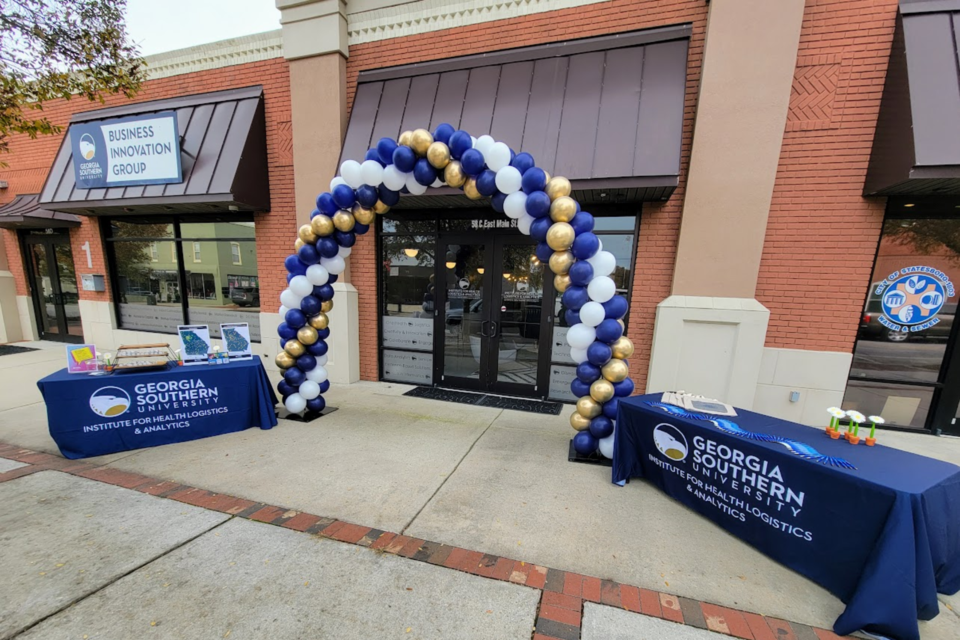
The Institute for Health Logistics & Analytics (IHLA) at Georgia Southern University hosted its grand opening on Thursday, November 30, 2023 amid a buzzing crowd. The downtown Statesboro location that formerly housed Cake Bistro and Bakery has been transformed into a modern and welcoming office environment where the IHLA team has been working since September.
Remarks began with IHLA Director, Dr. Jessica Schwind, who introduced Georgia Southern University’s Provost, Dr. Carl Reiber. Reiber applauded the efforts of the IHLA team and thanked the many distinguished guests and community members in attendance. “It is my great honor to welcome you to the grand opening of the Institute for Health Logistics and Analytics. Today marks a pivotal moment in the history of Georgia Southern University as we unveil the breadth of a groundbreaking institution that embodies the spirit of our commitment as a public impact university.”
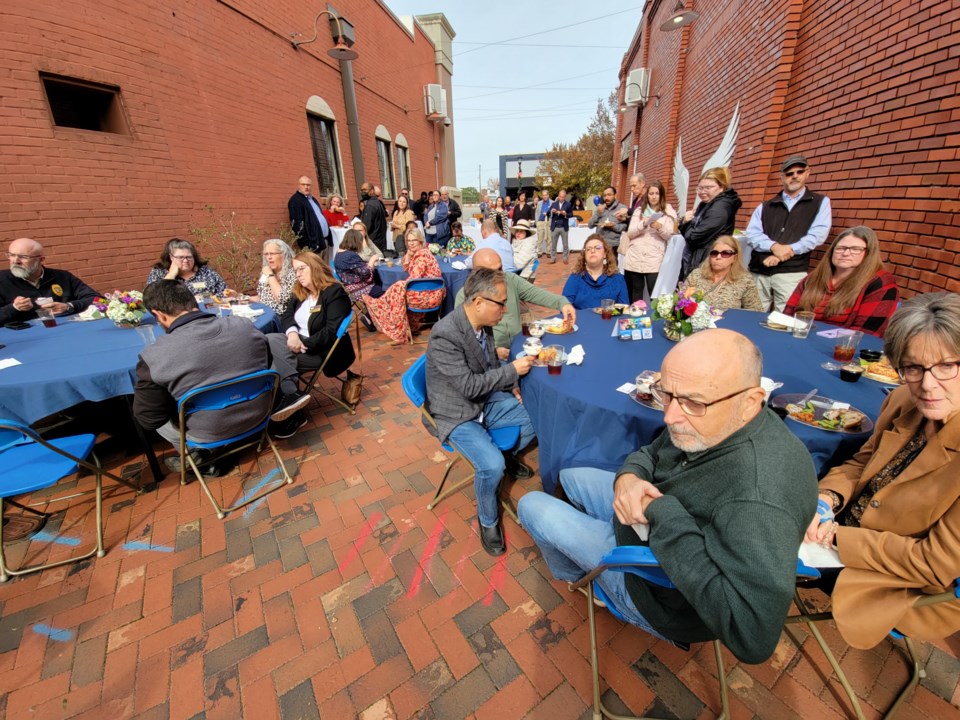
Reiber praised the IHLA’s efforts to foster vibrant communities, promote holistic well-being, advance logistics and build resilience. He also acknowledged IHLA’s success in securing over 125 million dollars in grants and contracts which will be used to make an incredible impact on communities across the region.
Reiber acknowledge that this achievement is a testament to the dedication, expertise, and innovation of the IHLA team and the trust placed in them by those funding these projects. IHLA is not just checking boxes, they are making real impact.
IHLA: A bridge between research and practice
IHLA’s mission, “To transform the health and well-being of our communities through applied evidence-based practices and technology integration” embodies the spirit of Georgia Southern’s commitment to excellence, impact and innovation, and of making a meaningful difference in the lives of those they serve. Reiber concluded by echoing that creating meaningful, positive community impact is the future of Georgia Southern University.
Remarks continued with Dr. Dominique Halaby, Associate Vice President for Innovation at Georgia Southern University. “I am genuinely honored to stand before you at this historic event.” Halaby shared, “I cannot believe that it has been 13 years since the University’s impact in downtown Statesboro began.”
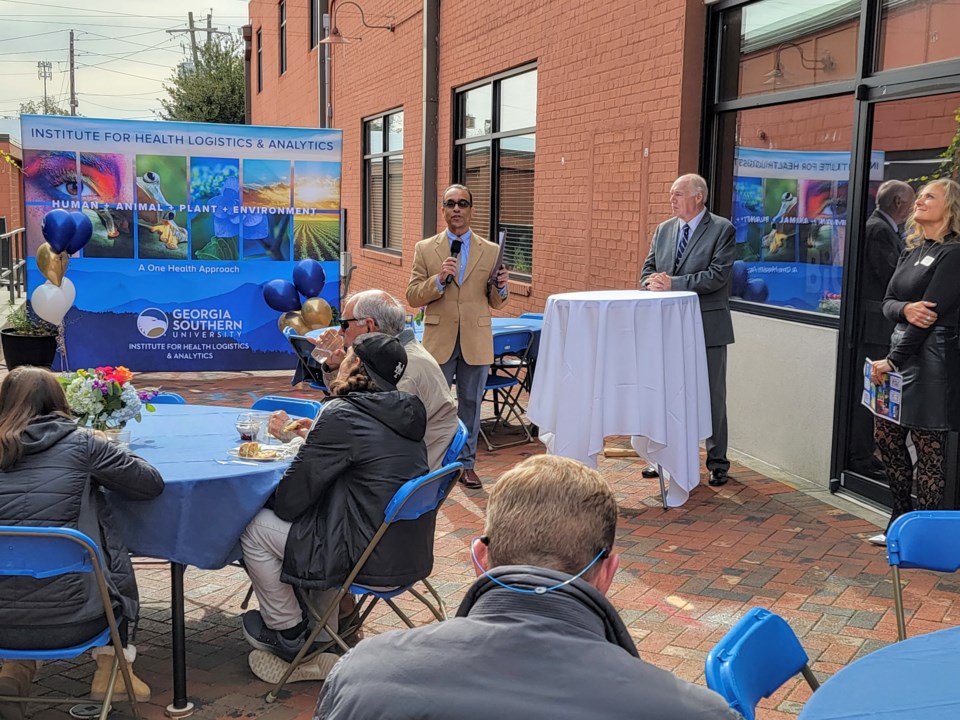
When the University partnered with the Downtown Statesboro Development Authority and the City of Statesboro 13 years ago, they looked for intentional and strategic ways to engage the community and benefit community members and local businesses. They looked for opportunities, “Not just to give the University a presence in downtown, but to engage the community in a meaningful way,” Halaby recalled.
Halaby briefly recounted the University’s history in downtown Statesboro, beginning with the relocation of the Small Business Development Center, the creation of BIG, and the countless events hosted and entrepreneurs served. “Now the opening of the IHLA represents another monumental achievement,” Halaby acknowledged. As Halaby closed, he encouraged attendees to embrace the exciting possibilities that IHLA represents to benefit the community and local businesses.
At the heart of IHLA: A dynamic team with a culture-first work environment
Schwind returned to the mic to introduce each member of the IHLA team and expressed her gratitude for each person’s unique strengths:
- Jill Johns, Project Manager
- Kathryn Stewart, Business and Finance Coordinator
- Marie Williams, Administrative Assistant
- Michelle Tremblay, Learning Experience Designer
- Deborah Harvey, Outreach and Marketing Coordinator
- Tanya Jules, Community Outreach Coordinator
- Hailey Hunnicutt, Community Outreach Coordinator
- Keegan Kiely, Graduate Assistant
- Mackenzie Mann, Graduate Assistant
- Joana Tome, Graduate Assistant
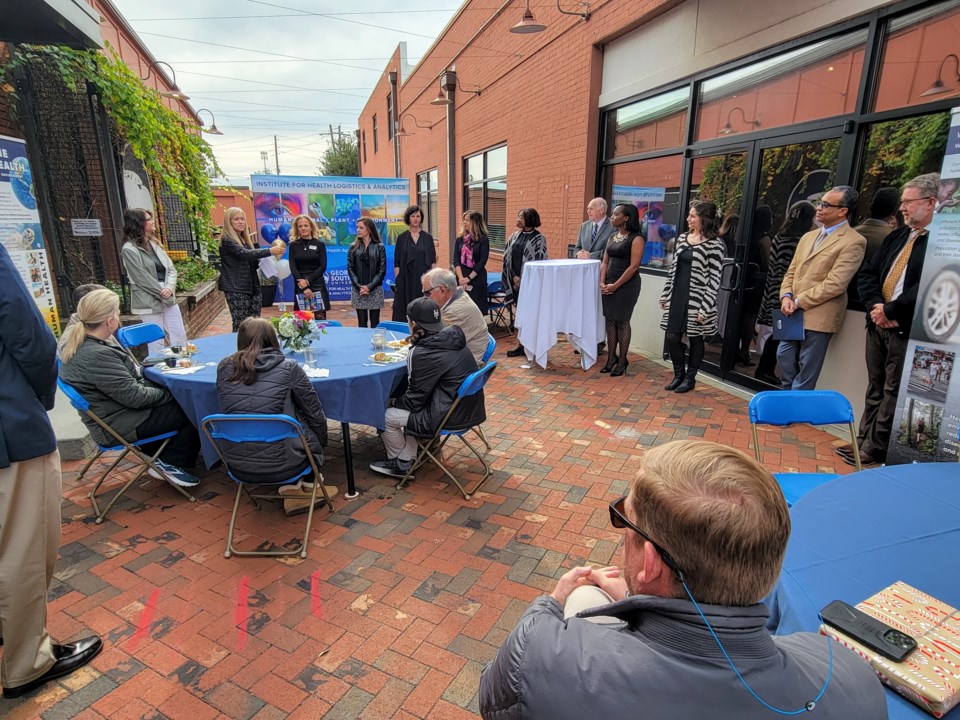
Schwind attributed the tremendous success of their organization to IHLA’s culture-first work environment. “In the beginning, I was going to be very mission-centric, […] but as we’ve grown, we’ve decided to be culture first,” Schwind shared. “Ultimately, if we focus on culture and how we can thrive in the workplace, how we can do amazing things in the community, then mission will come.”
Schwind explained, “The way that we work at IHLA is really project-based. So we talk about the project, and then we talk about what our roles are based on each of our strengths.”
She mentioned specific projects, including their recent K-12 initiative to place COVID-19 mitigation products in over 1,280 schools across the state of Georgia. “I am just so thankful to work for each and every one of you,” Schwind closed.
As the event continued, Jill Johns, IHLA’s project manager, recognized the contributions of each member of their team and acknowledged the tremendous effort that it took to get where they are now, “I stand before you today with immense pride and excitement as we inaugurate this new chapter for our Institute. The journey to this grand opening was paved by strategic vision and fueled by the unwavering dedication of an extraordinary group of individuals.”
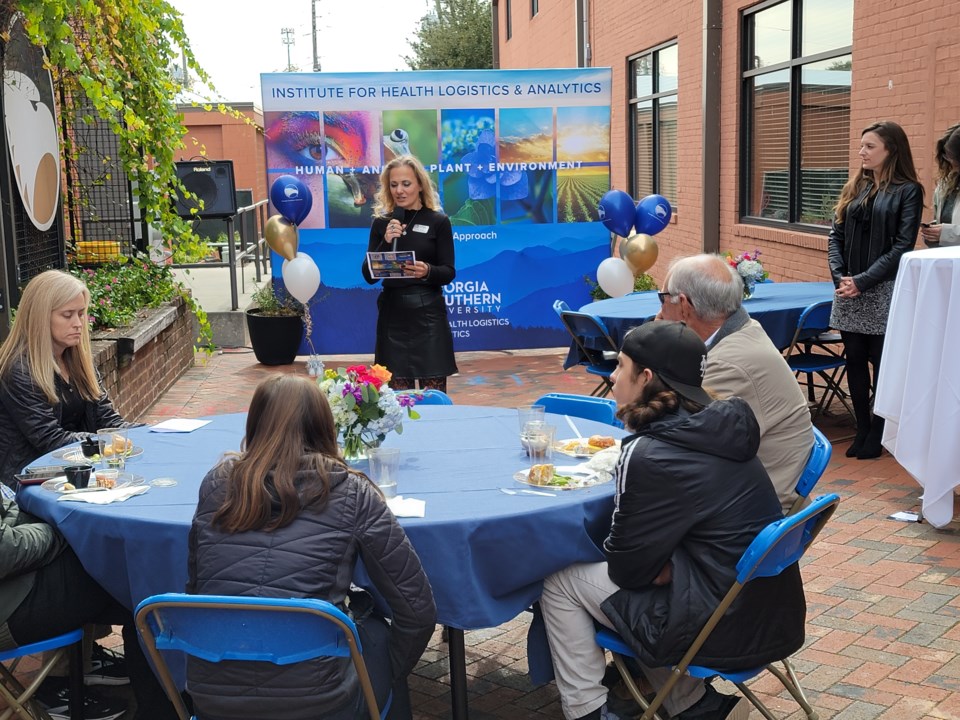
Schwind concluded the event by recognizing each of the vendors chosen for the grand opening. True to their mission of supporting local communities, they “stuck to the heart of the community” when choosing businesses to cater and decorate their celebration:
- Boro Bagels
- Tandoor and Tap
- Soyumi
- Daily Grind
- Cool Beanz
- Vandy’s
- Sugar Magnolia Bakery
- Flower Girl
- Party Impressions
All of these local merchants played a role in making the grand opening a success.
Learn more
For more details about the specific projects and initiatives IHLA is working on, visit their website at research.georgiasouthern.edu/health-logistics or stop by their new office at 58 East Main Street in downtown Statesboro.

